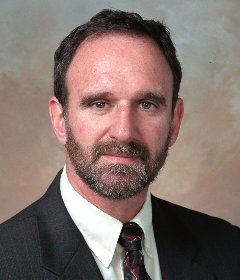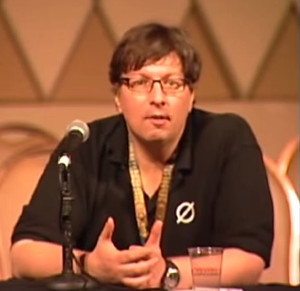
David Lee Chaum is an American computer scientist, cryptographer, and inventor. He is known as a pioneer in cryptography and privacy-preserving technologies, and widely recognized as the inventor of digital cash. His 1982 dissertation "Computer Systems Established, Maintained, and Trusted by Mutually Suspicious Groups" is the first known proposal for a blockchain protocol. Complete with the code to implement the protocol, Chaum's dissertation proposed all but one element of the blockchain later detailed in the Bitcoin whitepaper. He has been referred to as "the father of online anonymity", and "the godfather of cryptocurrency".

Martin Edward Hellman is an American cryptologist and mathematician, best known for his invention of public-key cryptography in cooperation with Whitfield Diffie and Ralph Merkle. Hellman is a longtime contributor to the computer privacy debate, and has applied risk analysis to a potential failure of nuclear deterrence.

Onion routing is a technique for anonymous communication over a computer network. In an onion network, messages are encapsulated in layers of encryption, analogous to the layers of an onion. The encrypted data is transmitted through a series of network nodes called "onion routers," each of which "peels" away a single layer, revealing the data's next destination. When the final layer is decrypted, the message arrives at its destination. The sender remains anonymous because each intermediary knows only the location of the immediately preceding and following nodes. While onion routing provides a high level of security and anonymity, there are methods to break the anonymity of this technique, such as timing analysis.
Markus Guenther Kuhn is a German computer scientist, currently working at the Computer Laboratory, University of Cambridge and a fellow of Wolfson College, Cambridge.
The Free Haven Project was formed in 1999 by a group of Massachusetts Institute of Technology students with the aim to develop a secure, decentralized system of data storage. The group's work led to a collaboration with the United States Naval Research Laboratory to develop Tor, funded by DARPA.

Matt Blaze is an American researcher who focuses on the areas of secure systems, cryptography, and trust management. He is currently the McDevitt Chair of Computer Science and Law at Georgetown University, and is on the board of directors of the Tor Project.
A Sybil attack is a type of attack on a computer network service in which an attacker subverts the service's reputation system by creating a large number of pseudonymous identities and uses them to gain a disproportionately large influence. It is named after the subject of the book Sybil, a case study of a woman diagnosed with dissociative identity disorder. The name was suggested in or before 2002 by Brian Zill at Microsoft Research. The term pseudospoofing had previously been coined by L. Detweiler on the Cypherpunks mailing list and used in the literature on peer-to-peer systems for the same class of attacks prior to 2002, but this term did not gain as much influence as "Sybil attack".
An anonymizer or an anonymous proxy is a tool that attempts to make activity on the Internet untraceable. It is a proxy server computer that acts as an intermediary and privacy shield between a client computer and the rest of the Internet. It accesses the Internet on the user's behalf, protecting personal information of the user by hiding the client computer's identifying information such as IP addresses. Anonymous proxy is the opposite of transparent proxy, which sends user information in the connection request header. Commercial anonymous proxies are usually sold as VPN services.
Virgil Dorin Gligor is a Romanian-American professor of electrical and computer engineering who specializes in the research of network security and applied cryptography.

Tor is free and open-source software for enabling anonymous communication. It directs Internet traffic via a free, worldwide volunteer overlay network that consists of more than seven thousand relays.

Farinaz Koushanfar is an Iranian-American computer scientist whose research concerns embedded systems, ad-hoc networks, and computer security. She is a professor and Henry Booker Faculty Scholar of Electrical and Computer Engineering at the University of California, San Diego.
Stephanie Forrest is an American computer scientist and director of the Biodesign Center for Biocomputing, Security and Society at the Biodesign Institute at Arizona State University. She was previously Distinguished Professor of Computer Science at the University of New Mexico in Albuquerque. She is best known for her work in adaptive systems, including genetic algorithms, computational immunology, biological modeling, automated software repair, and computer security.

Matthew Daniel Green is an American cryptographer and security technologist. Green is an Associate Professor of Computer Science at the Johns Hopkins Information Security Institute. He specializes in applied cryptography, privacy-enhanced information storage systems, anonymous cryptocurrencies, elliptic curve crypto-systems, and satellite television piracy. He is a member of the teams that developed the Zerocoin anonymous cryptocurrency and Zerocash. He has also been influential in the development of the Zcash system. He has been involved in the groups that exposed vulnerabilities in RSA BSAFE, Speedpass and E-ZPass. Green lives in Baltimore, MD with his wife, Melissa, 2 children and 2 miniature dachshunds.

Roger Dingledine is an American computer scientist known for having co-founded the Tor Project. A student of mathematics, computer science, and electrical engineering, Dingledine is also known by the pseudonym arma. As of December 2016, he continues in a leadership role with the Tor Project, as a project Leader, Director, and Research Director.

Yuval Elovici is a computer scientist. He is a professor in the Department of Software and Information Systems Engineering at Ben-Gurion University of the Negev (BGU), where he is the incumbent of the Davide and Irene Sala Chair in Homeland Security Research. He is the director of the Cyber Security Research Center at BGU and the founder and director of the Telekom Innovation Laboratories at Ben-Gurion University. In addition to his roles at BGU, he also serves as the lab director of Singapore University of Technology and Design’s (SUTD) ST Electronics-SUTD Cyber Security Laboratory, as well as the research director of iTrust. In 2014 he co-founded Morphisec, a start-up company, that develops cyber security mechanisms related to moving target defense.
A wireless onion router is a router that uses Tor to connect securely to a network. The onion router allows the user to connect to the internet anonymously creating an anonymous connection. Tor works using an overlaid network which is free throughout the world, this overlay network is created by using numerous relay points created using volunteer which helps the user hide personal information behind layers of encrypted data like layers of an onion. Routers are being created using Raspberry Pi adding a wireless module or using its own inbuilt wireless module in the later versions.

George Danezis, FBCS is a computer scientist and Professor of Security and Privacy Engineering at the Department of Computer Science, University College London where he is part of the Information Security Research Group, and a fellow at the Alan Turing Institute. He co-founded Chainspace, a sharded smart contract platform, and was Head of Research before it was acquired by Facebook. After leaving Facebook he co-founded MystenLabs and is one of the designers of the Sui Blockchain. He currently works part-time as a Professor at University College London and as Chief Scientist at MystenLabs.
Mathias Payer is a Liechtensteinian computer scientist. His research is invested in software and system security. He is Associate Professor at the École Polytechnique Fédérale de Lausanne (EPFL) and head of the HexHive research group.
Security Controls for Computer Systems, commonly called the Ware report, is a 1970 text by Willis Ware that was foundational in the field of computer security.
IEEE Symposium on Security and Privacy also known as the Oakland Conference is an annual conference focussing on topics related to computer security and privacy. The conference was founded in 1980 by Stan Ames and George Davida and is considered to be among the top conferences in the field. The conference has a single track and follows a double-blind review process to ensure fairness during peer review.










